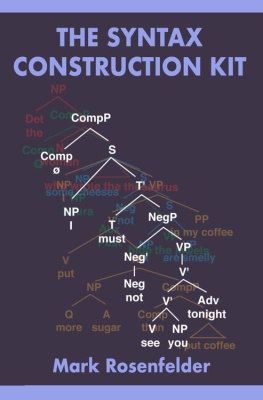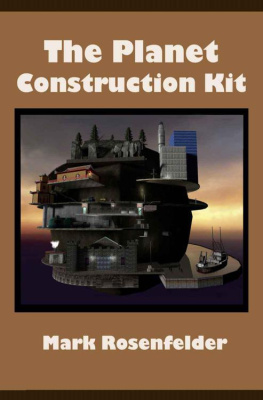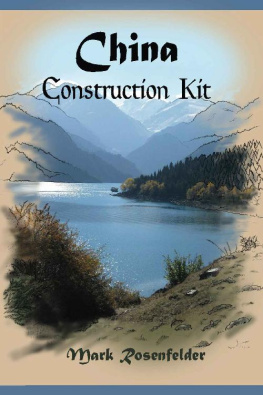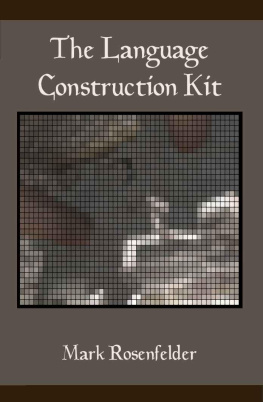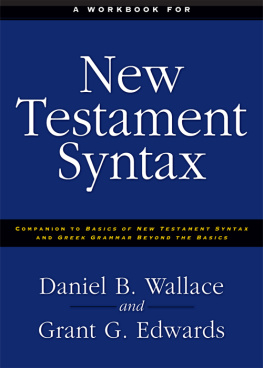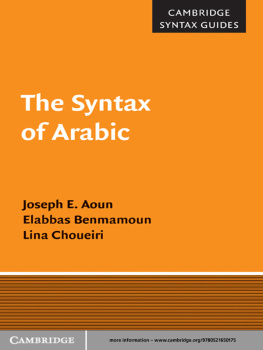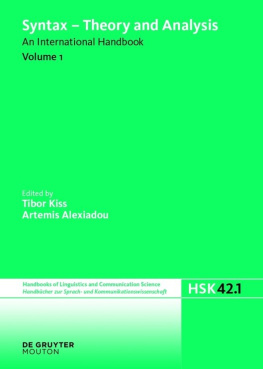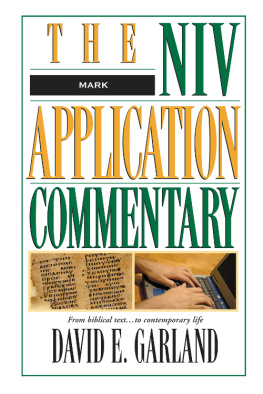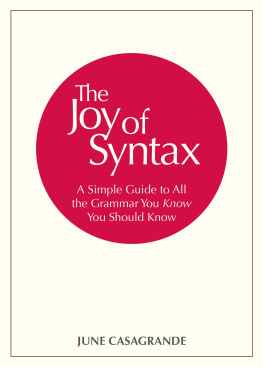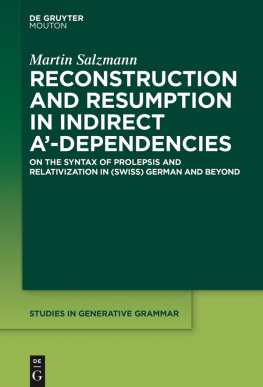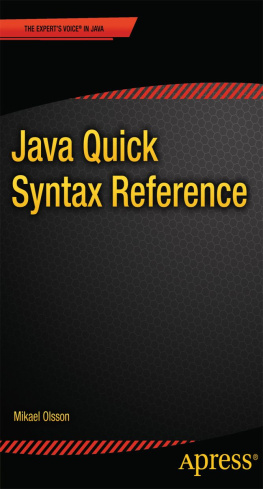Mark Rosenfelder - The Syntax Construction Kit
Here you can read online Mark Rosenfelder - The Syntax Construction Kit full text of the book (entire story) in english for free. Download pdf and epub, get meaning, cover and reviews about this ebook. City: Chicago, year: 2018, publisher: Yonagu, genre: Science. Description of the work, (preface) as well as reviews are available. Best literature library LitArk.com created for fans of good reading and offers a wide selection of genres:
Romance novel
Science fiction
Adventure
Detective
Science
History
Home and family
Prose
Art
Politics
Computer
Non-fiction
Religion
Business
Children
Humor
Choose a favorite category and find really read worthwhile books. Enjoy immersion in the world of imagination, feel the emotions of the characters or learn something new for yourself, make an fascinating discovery.
- Book:The Syntax Construction Kit
- Author:
- Publisher:Yonagu
- Genre:
- Year:2018
- City:Chicago
- Rating:3 / 5
- Favourites:Add to favourites
- Your mark:
- 60
- 1
- 2
- 3
- 4
- 5
The Syntax Construction Kit: summary, description and annotation
We offer to read an annotation, description, summary or preface (depends on what the author of the book "The Syntax Construction Kit" wrote himself). If you haven't found the necessary information about the book — write in the comments, we will try to find it.
The Syntax Construction Kit — read online for free the complete book (whole text) full work
Below is the text of the book, divided by pages. System saving the place of the last page read, allows you to conveniently read the book "The Syntax Construction Kit" online for free, without having to search again every time where you left off. Put a bookmark, and you can go to the page where you finished reading at any time.
Font size:
Interval:
Bookmark:
CONTENTS

by Mark Rosenfelder

Yonagu Chicago 2018
2018 by Mark Rosenfelder.
All rights reserved, including the right to reproduce this book or portions thereof in any form whatsoever, except for review purposes.
Kindle edition 1.0
Contents
Introduction
The Chomsky hierarchy
Syntactic Structures
Movement
Constituents
X-bar syntax
Topics in Syntax
Relatives and other problems
Minimalism
Production
Relational grammars
Conlang syntax
A syntactic bestiary
Bibliography
Introduction
This book is about syntax, the forgotten one-fourth of your grammar.
Youre not alone. William Dwight Whitneys magisterial Sanskrit Grammar (1879) devotes 32 pages to phonology and orthography, 47 pages to sandhi, and 377 to morphology. And thats it: there is no syntax section.
Of course, syntax wasnt entirely ignored; thats why it has a nice Greek name, from , with-ordering. With the classical languages, ordering was what seemed to be left once youd mastered those hundreds of pages of morphology.
And the ordering rules seemed to be pretty simple! In Molires Le bourgeois gentilhomme (1670), M. Jourdain gives the sentence
Belle marquise, vos beaux yeux me font mourir damour.
Beautiful marquise, your beautiful eyes me make die of love.
and his matre de philosophie informs him that this can equally be written
Damour mourir me font, belle marquise, vos beaux yeux.
Vos beaux yeux me font, belle marquise, mourir damour.
Mourir vos beaux yeux, belle marquise, damour me font.
Me font vos beaux yeux mourir, belle marquise, damour.
M. Jourdain is perplexed: But of all those ways of saying it, which is the best?
The one you said: Belle marquise, vos beaux yeux me font mourir damour.
His client is tickled: Ive never studied, and yet I did that on the first try.
Molires satire captures the feeling that syntax was faintly irrelevant, a matter of polish. If he could read this book, Im convinced that hed see that its far more than that.
Theres a lot more we could say about M. Jourdains sentence. For now, just one thought: the matre s rearrangements are by no means lawless; he only rearranges five sub-parts of the sentence, not its ten words. Why do you think that is?
What you know and what you know
M. Jourdain can produce prose, even though he doesnt know what prose is. This is one facet of a big surprising thing that well run into over and over in this book: as an English speaker, you have a very detailed and sophisticated analysis of syntax and for the most part you cant consciously access it.
Ill talk a lot about the English verbal complex, because its a hard but not intractable puzzle. Lets take a quiz. Here are some variants of a sentence:
The fish were caught by her.
She has caught fish.
She can catch fish.
Shes catching fish.
Thats passive, perfect, modal, and progressive. You can combine them e.g. She has been catching fish. In fact, all four can occur in one sentence. In that case, without trying out alternatives in your head, what order do they appear in?
Or, when precisely do we use he and him? If youre a conlanger or you know a highly inflected language, youll quickly reply He is nominative, or He is for the subject. But what about:
Sarah wants him to move out.
Isnt him the subject of to move out? (Its not the object of want. What does Sarah want? Him? No, she wants for him to move out.)
These examples are intended to show that you dont consciously know the precise rules of syntax, but your brain does: it effortlessly creates sentences that follow those rules.
In my other books, the emphasis was on things you probably didnt know e.g. how ergativity or logographic writing works. Theres some of that here (how Malagasy relative clauses or Mandarin pivot clauses work), but a lot of syntax is getting that hidden part of the brain to cough up its secrets.
How this book fits into my uvre and yours
If you want to start creating conlangs (or learning basic linguistics), The Language Construction Kit is for you. It covers phonology (the sounds of language), both morphology and syntax, and more areas that traditional grammars skipped: semantics and pragmatics. It also introduces writing systems and historical linguistics.
Advanced Language Construction covers additional topics such as logic, pidgins, language development, logographic writing, and Sign. Then theres a leisurely look at morphosyntax , a nice word that emphasizes that a particular linguistic concept might be addressed as morphology in one language, as syntax in another.
And then The Conlangers Lexipedia tackles the lexicon, the biggest part of any language or conlang, and one aspect of language that cant be neatly separated from real-world knowledge.
Then we get to conworlding see The Planet Construction Kit . And specific areas of the world to use for inspiration or general knowledge: China Construction Kit, India Construction Kit .
Do I need to have read any of these to use this book?
No, but Im not going to spend time explaining morphemes or aspects here, much less go over basic English grammar. Reading the LCK first wont hurt, and youll get more out of this book if youve read ALC.
So Ive written a lot, and perhaps youve read a lot, about language. Ive felt for a long time that something was missing, and that something was generative grammar (GG).
Now, Ive said in other books that you can write a good grammar without generative syntax at all. And its true! You dont need to create a single syntax tree or transformation.
On the other hand, this is one of the most fun parts of linguistics. Its a relatively new part of the field, so its the part most likely to teach you things you hadnt ever thought of before. And for the same reason, its one area of language where you can quite easily find facts about language nobody has thought of before.
Plus, it gives you a toolkit that deepens your understanding of language and what you can do with your conlangs. Studying syntax is like going from making up alphabets to making up phonological systems. You can fill your syntax section with far more than sentence and noun phrase order.
If youre a certain type of person, generative grammar will also open some unexpected doors to neurolinguistics, to psychology, to computer science, to logic.
Cocktail party pitch
So, syntax is about the order of words. What else?
One answer: its about structure . Sentences are made of pieces bigger than words, and languages have a whole toolkit for acting on those pieces. Well look at what those pieces and those tools are, and how they work.
Another way to look at it: Suppose youd like to make a machine that spits out English sentences all day long. Each one should be different, and each one should be good English. How would you make that machine in the simplest way possible ?
That is, were not interested (right now) in a Manhattan-sized computer that knows everything. We also, of course, dont want a machine that cant do it one that misses some sentences, or spits out bad ones. We want the dumbest machine that works.
And one more stipulation: we dont insist that they be meaningful utterances. Were not conducting a conversation with the machine. Well be happy if it outputs John is a ten foot tall bear thats a valid sentence, we dont care if someone named John is nearby, if hes a bear or not, or if hes bigger or smaller than ten feet.
Next pageFont size:
Interval:
Bookmark:
Similar books «The Syntax Construction Kit»
Look at similar books to The Syntax Construction Kit. We have selected literature similar in name and meaning in the hope of providing readers with more options to find new, interesting, not yet read works.
Discussion, reviews of the book The Syntax Construction Kit and just readers' own opinions. Leave your comments, write what you think about the work, its meaning or the main characters. Specify what exactly you liked and what you didn't like, and why you think so.

